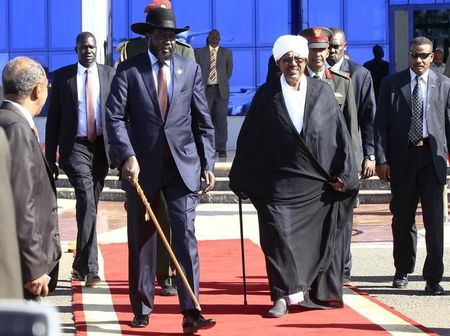By Louis Charbonneau and Michelle Nichols
UNITED NATIONS (Reuters) - The U.S. delegation to the United Nations informed members of the Security Council on Tuesday that it would circulate a draft resolution establishing an international sanctions regime for conflict-torn South Sudan, a U.S. official said.
"The resolution will establish a mechanism for targeting individuals undermining South Sudan's political stability and abusing human rights," the official said on condition of anonymity.
"We believe targeted measures are appropriate at this time to support efforts to establish a peace agreement and cessation of hostilities," the official said. He did not say when the draft would be circulated to the 15-nation council and put to a vote.
Australian U.N. Ambassador Gary Quinlan, president of the Security Council this month, also declined to comment on the likely timing of any sanctions moves. But he told reporters his country and several other council members supported the idea of making an arms embargo part of any South Sudan sanctions regime.
South Sudan President Salva Kiir and rebel leader Riek Machar must continue to engage in peace talks led by the East African regional bloc IGAD, the U.S. official added.
"To date, there has been insufficient progress in those talks due, in part, to the political spoilers and human rights abusers whose violent actions have undermined progress," the official said.
"This resolution is a first step in increasing the pressure on all parties and sending a strong message that those most responsible for South Sudan's political and humanitarian crisis will be held accountable," he added.
The United States began imposing bilateral sanctions on South Sudanese individuals in May. The official said establishing a U.N. sanctions regime would demonstrate the world's resolve in bringing an end to the civil war.
China, a permanent member of the UN Security Council, said it opposed the use of sanctions and preferred handling human rights issues on the basis of "mutual respect, dialogue and cooperation".
"We consistently oppose using sanctions at every turn in international affairs," Foreign Ministry spokesman Hong Lei told a regular press briefing in Beijing on Wednesday.
China is expected to contribute 700 peacekeepers to a UN mission in South Sudan at the start of next year to help protect civilians, the first time it has committed an infantry battalion to such an operation.
Fighting erupted in December in South Sudan, which declared independence from Sudan in 2011, after months of political tension between Kiir and his sacked deputy and rival, Machar. The conflict has reopened deep fault lines among ethnic groups, pitting Kiir's Dinka against Machar's Nuer.
Peace talks brokered by IGAD have yet to reach a deal. The two sides are due to hold a fresh round of discussions in the Ethiopian capital Addis Ababa, but the start date is uncertain.
A ceasefire signed in January has been broken frequently and peace talks have often stalled, frustrating Western backers of South Sudan. The European Union has also joined the United States in imposing sanctions on commanders on both sides for violating the ceasefire.

The conflict has killed more than 10,000 people in the world's newest state, caused over 1 million to flee and driven the country of 11 million closer to famine.
(Additional reporting by Michael Martina in Beijing; Editing by G Crosse and Alan Crosby; Editing by Ken Wills and Clarence Fernandez)
